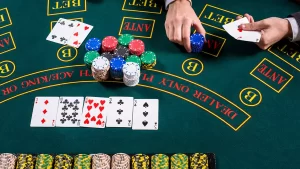Poker is a game of chance but there are some basic strategies that can help you win more often. These strategies can be applied to any casino table game or machine.
One of the best ways to improve your poker strategy is to start playing fewer hands. This will reduce your variance and allow you to play longer on the same bankroll.
1. Stack size
The size of your and your opponent’s stacks should be a major consideration in every hand you play. It can dramatically affect the potential leverage of a wager either one might make.
If your opponents have large stacks, they will be less likely to raise their hands with marginal hands like top pair or suited connectors. This is because the risk of making a mistake and losing an entire stack is much higher than when your opponents have small stacks.
Similarly, you should avoid taking risks with short stacks because mistakes are much more costly. However, if other players have smaller stacks than you then it’s possible to play more advanced hands. This is because you can exploit their bluffing strategies by raising pre-flop or betting on the flop.
2. Blind bets
Blind bets eat into your EV, especially in heads-up games. Players often overfold to big blind aggression from the small blind, and this can bleed you out in a significant way. Moreover, it’s a common mistake to call every raise when you’re in the small blind with a marginal hand.
Instead, you should consider raising frequently when you have a strong hand. By doing this, you’ll keep your opponent’s range linear rather than divided (since your bet sizes will depend on what you represented on previous streets). This will make it much harder for them to bluff against you. Besides, you’ll also be more likely to steal with your strong hands when you raise. Steal sparingly, though, or the opponents will assume you’re bluffing.
3. Checking
One way to increase your chances of winning a hand is by checking. This will make your opponents think that you have a strong hand and they may fold if they call. This strategy also gives you the opportunity to bluff if your opponent has a weak hand.
Checking can help you avoid over-betting when you have a strong hand. However, you should avoid doing it with a weak hand. Two middle cards, for instance, are not strong enough to bet. It is recommended to bet with high cards such as Jacks, Queens, Kings, or Aces. This is because they can form a pair or lead to a Straight, Flush, or Three of a Kind. This will give you the highest return to player (RTP) percentages.
4. Limits
Table limit games offer a good opportunity for players to practice their poker skills without risking too much money. They also tend to be more predictable than other types of games. This makes them better suited to new players who want to learn poker strategy and improve their bluffing ability.
In limit games, each player can only bet a certain amount in one round. This limits the number of times they can raise during a hand and allows them to focus on the pot odds. This makes the game less volatile than no limit games, which allow players to raise whenever they want. The fixed betting structure can also help players make more accurate calculations about their chances of winning a hand. This can make the game more profitable for them.
5. Bluffing
Bluffing is a valuable strategy that can increase your gains when you have a strong hand. However, it requires a solid understanding of your opponent’s betting patterns and tendencies. A good bluff should make sense to your opponent and be believable. It also helps to build a tight image and have a consistent betting pattern.
Loose-aggressive players are the most challenging opponents to bluff against because they often read hands well and chase small pots. To beat them, you must represent strength plausibly and attempt to build large pots if possible. In addition, it is essential to mix up your physical tells. This will confuse your opponents and make them doubt whether you have a strong hand or not. You should also consider the stakes you are playing at and your opponents’ calling tendencies.












More Stories
The Impact of Legalized Sports Betting on the Casino Industry
The Psychology of Betting – Why We Love to Gamble
What You Need to Know About Casino News